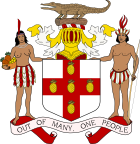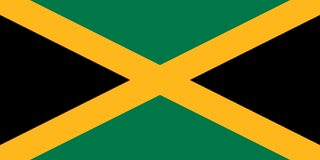
The Caribbean island of Jamaica was inhabited by the Arawak tribes prior to the arrival of Columbus in 1494. Early inhabitants of Jamaica named the land "Xaymaca", meaning "Land of wood and water". The Spanish enslaved the Arawaks, who were so ravaged by their conflict with the Europeans and by foreign diseases that nearly the entire native population was extinct by 1600. The Spanish also transported hundreds of West African slaves to the island.
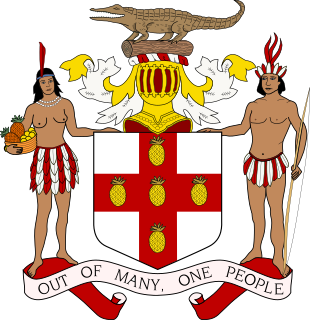
Politics in Jamaica takes place in the framework of a representative parliamentary democratic constitutional monarchy. The 1962 Constitution of Jamaica established a parliamentary system whose political and legal traditions closely follow those of the United Kingdom. As the head of state, Queen Elizabeth II - on the advice of the Prime Minister of Jamaica - appoints a governor-general as her representative in Jamaica. The governor-general has a largely ceremonial role. Jamaica constitutes an independent Commonwealth realm.
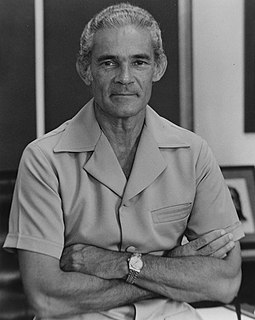
Michael Norman Manley ON OCC was a Jamaican politician who served as the fourth Prime Minister of Jamaica from 1972 to 1980 and from 1989 to 1992. Coming from a prosperous background, Manley was a democratic socialist. According to opinion polls, he remains one of Jamaica's most popular prime ministers.

The People's National Party (PNP) is a social-democratic political party in Jamaica, founded in 1938 by activist Osmond Theodore Fairclough. It holds 30 of the 63 seats in the House of Representatives, as well as a majority of local government bodies, with 151 of the 228 divisions. The party is democratic socialist by constitution.
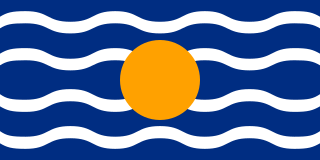
The West Indies Federation, also known as the West Indies, the Federation of the West Indies or the West Indian Federation, was a short-lived political union that existed from 3 January 1958 to 31 May 1962. Various islands in the Caribbean that were colonies of the United Kingdom, including Trinidad and Tobago, Barbados, Jamaica, and those on the Leeward and Windward Islands, came together to form the Federation, with its capital in Port of Spain, Trinidad and Tobago. The expressed intention of the Federation was to create a political unit that would become independent from Britain as a single state—possibly similar to the Canadian Confederation, Australian Commonwealth, or Central African Federation; however, before that could happen, the Federation collapsed due to internal political conflicts over how the Federation itself would be governed or how it would viably function. The territories that would have become part of the Federation eventually became the nine contemporary sovereign states of Antigua and Barbuda, Barbados, Dominica, Grenada, Jamaica, Saint Kitts and Nevis, Saint Lucia, Saint Vincent and the Grenadines, and Trinidad and Tobago; with Anguilla, Montserrat, the Cayman Islands, and Turks and Caicos Islands becoming British overseas territories. British Guiana (Guyana) and British Honduras (Belize) held observer status within the West Indies Federation.

The Prime Minister of Jamaica is Jamaica's head of government, currently Andrew Holness. Holness, as leader of the governing Jamaica Labour Party (JLP), was sworn in as Prime Minister on 3 March 2016, succeeding People's National Party (PNP) leader Portia Simpson-Miller. This was a result of the JLP's victory in Jamaica's 25 February 2016 general election.

The National Democratic Movement (NDM) is a conservative political party in Jamaica, led by Peter Townsend.

Elections in Jamaica provides information on elections and election results in Jamaica.

Portia Lucretia Simpson-Miller,, is a Jamaican politician. She served as Prime Minister of Jamaica from March 2006 to September 2007 and again from 5 January 2012 to 3 March 2016. She was the leader of the People's National Party from 2006 to 2017 and the Leader of the Opposition twice, from 2007 to 2012 and from 2016 to 2017.
The Jamaican Sportsman and Sportswoman of the Year is an annual election, organised by the RJR Sports Foundation, which honours outstanding achievement(s) in sport by Jamaican athletes during the previous year.

General elections were held in Jamaica on 18 December 1997. The ruling People's National Party of Prime Minister P. J. Patterson won 50 of the 60 seats defeating the main opposition Jamaica Labour Party.

Andrew Michael Holness, ON, MP is a Jamaican politician who has been the Prime Minister of Jamaica since 3 March 2016, following the 25 February 2016 general election. Holness previously served as Prime Minister from October 2011 to January 5, 2012. He succeeded Bruce Golding as Prime Minister, and decided to go to the polls in the 29 December 2011 general election in an attempt to get his own mandate from the Jamaican electorate. He failed in that bid, however, losing badly to the People's National Party led by Portia Simpson-Miller, with the PNP gaining 42 seats to the Jamaica Labour Party's 21. Following that defeat, Holness served as Leader of the Opposition from January 2012 to March 2016, when he once again assumed the position of Prime Minister.

The 2011 Jamaican general election was held on 29 December 2011 in Jamaica. The election was contested mainly between the nation's two major political parties, the governing Jamaica Labour Party (JLP), led by Andrew Holness, and the Portia Simpson-Miller-led opposition People's National Party (PNP). The result was a landslide victory for the PNP which won 42 of the 63 seats, a two-thirds majority.

General elections were held in Jamaica on 25 February 2016. The elections were largely a contest between the governing People's National Party (PNP) and the opposition Jamaica Labour Party (JLP). The result was a narrow victory for the JLP, which won 32 of the 63 seats. One political commentator described the poll as "the closest election Jamaica has ever had".

Federal elections were held in the West Indies Federation for the first and only time on 25 March 1958. The result was a victory for the West Indies Federal Labour Party, which won 25 of the 45 seats in the House of Representatives.

Republicanism in Jamaica is a position which advocates that Jamaica's system of government be changed from a constitutional monarchy to a republic. Both major political parties – the Jamaica Labour Party and the People's National Party – subscribe to the position, and the current Prime Minister of Jamaica, Andrew Holness, has announced that transitioning to a republic will be a priority of his government.
The Jamaican political conflict is a long standing feud between right-wing and left-wing elements in the country, often exploding into violence. The Jamaican Labor Party and the People's National Party have fought for control of the island for years and the rivalry has encouraged urban warfare in Kingston. Each side believes the other to be controlled by foreign elements, the JLP is said to be backed by the American Central Intelligence Agency and the PNP is said to been backed by the Soviet Union and Fidel Castro.
